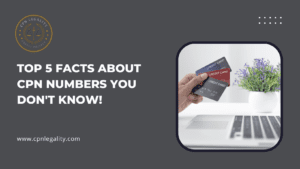
3-Step Formula to Financial Success With CPN Numbers
Achieve financial success with our 3-Step Formula leveraging CPN Numbers for a secure and prosperous future.

CPN (Credit Privacy Number) is a term that is often associated with credit-related matters and personal privacy. By understanding the purpose and benefits of CPN, individuals can make informed decisions regarding their credit and privacy needs.
In this article, we will delve into the uses of CPN and explore who utilizes CPN and why.
There are many uses of CPN (credit profile number). Some of discussed here:
One of the primary uses of CPN is to establish or rebuild credit history. Individuals with poor credit scores or no credit history may find it challenging to obtain loans, credit cards, or favorable interest rates.
CPN can provide an alternative identification number to use when applying for credit, allowing individuals to build a separate credit profile. This can be particularly useful for those who have faced financial difficulties in the past and are seeking a fresh start.
With the increasing risk of identity theft and data breaches, protecting personal information has become paramount. CPN can help safeguard sensitive data by providing an additional layer of privacy. By using a CPN in certain situations instead of their Social Security Number (SSN), individuals can reduce the risk of their personal information falling into the wrong hands.
CPN can also be beneficial for securing financial transactions. When making purchases or conducting business online, individuals may feel hesitant to share their SSN due to concerns about data security. By using a CPN instead, individuals can maintain their privacy while still engaging in necessary financial activities.
Privacy concerns are prevalent in today’s digital age. CPN offers individuals an opportunity to separate their personal and financial lives. By using a CPN, individuals can limit the visibility of their personal information and keep their financial matters more private.

There are many people who use CPN for their purposes. Here are some of them:
Individuals who have experienced financial difficulties or have a poor credit history often seek alternative ways to improve their creditworthiness. CPN provides an avenue to establish a new credit profile and work towards better financial standing.
Identity theft can wreak havoc on a person’s financial well-being and reputation. Victims of identity theft may choose to utilize CPN as a means of rebuilding their credit and protecting themselves from further harm.
Celebrities and public figures often face unique challenges when it comes to privacy and security. CPNs can offer an additional layer of protection by allowing them to conduct financial transactions without revealing their SSNs.
Business owners and entrepreneurs may opt for CPN to separate their personal and business finances. This separation can help them maintain accurate accounting records and protect their personal assets in case of business-related issues.
The purpose of a CPN (Credit Privacy Number) is to serve as an alternative identification number for credit-related activities. It offers individuals a way to establish or rebuild credit history, protect personal information, secure financial transactions, and maintain privacy.
Here we discuss in detail:
One of the primary purposes of CPN is to establish creditworthiness. CPN allows individuals with poor credit history or no credit history to build a separate credit profile.
By using CPN when applying for credit, individuals can demonstrate their creditworthiness and improve their chances of obtaining loans, credit cards, or favorable interest rates.
CPN serves as a tool for safeguarding personal privacy. With the increasing risk of identity theft and data breaches, protecting personal information has become crucial.
CPN provides an additional layer of privacy by offering an alternative number to use in certain situations instead of one’s Social Security Number (SSN).
This helps reduce the risk of personal information falling into the wrong hands.
CPN can help mitigate financial risks by providing an alternative identification number for credit-related activities. By separating personal and business finances, individuals can minimize the potential impact of financial setbacks on their personal lives.
In today’s digital age, privacy concerns are significant. CPN allows individuals to separate their personal and financial lives, limiting the visibility of personal information. By using CPN, individuals can keep their financial matters more private and reduce the chances of their personal information being exposed.
For business owners and entrepreneurs, CPN offers a means to separate personal and business finances. This separation ensures clear accounting practices, simplifies tax reporting, and protects personal assets from business-related liabilities.
CPN can be useful for securing financial transactions, especially in online or business settings. Instead of sharing their SSN, individuals can use CPN to maintain their privacy while engaging in necessary financial activities such as making purchases or conducting business transactions.
CPN, or Credit Privacy Number, serves several important purposes in today’s credit-driven world. It allows individuals to build a credit history, protect personal information, secure financial transactions, and maintain privacy.
CPN finds application among individuals with poor credit history, victims of identity theft, celebrities, public figures, and business owners.
Whether the goal is to establish creditworthiness, safeguard privacy, mitigate financial risks, or separate personal and business finances, CPN provides a valuable tool to address these needs.
No, CPN does not erase or replace your existing credit history. It provides an alternative identification number for credit-related purposes.
While CPN itself is legal, it is essential to use it responsibly and in compliance with applicable laws. It is advisable to consult with legal professionals to ensure proper usage.
No, using CPN alone will not guarantee a perfect credit score. Building and maintaining good credit involves responsible financial practices and timely payment of debts.
CPNs are not issued or recognized by government agencies. Be cautious of fraudulent services claiming to provide legitimate CPNs. Seek professional advice if you require assistance.
No, it is not necessary or advisable to replace your SSN with CPN in all transactions. Use CPN selectively, especially in situations where privacy and security are major concerns.
To use a CPN legally, it should only be used for privacy, not for fraudulent activities. It’s essential to comply with all laws and regulations while using a CPN.

Achieve financial success with our 3-Step Formula leveraging CPN Numbers for a secure and prosperous future.

Uncover hidden truths with the top 5 facts about CPN numbers that you never knew in this revealing exploration.

Discover the ins and outs of buying CPNs – Are they right for you? Explore the world of CPNs and their implications.

Comparing CPN Numbers and Secured Credit Cards – Uncover the best credit-building options and make informed financial choices.
Call us now!
©2023 by CPN Legality. Managed by Abaani Tech